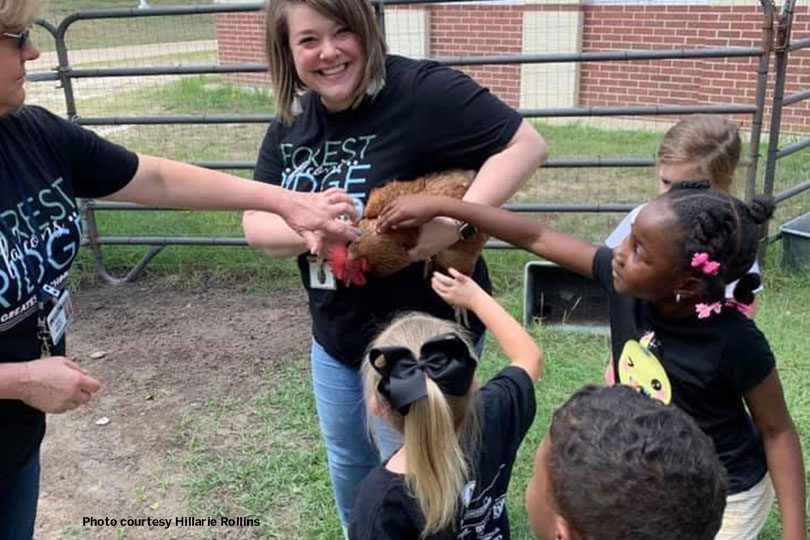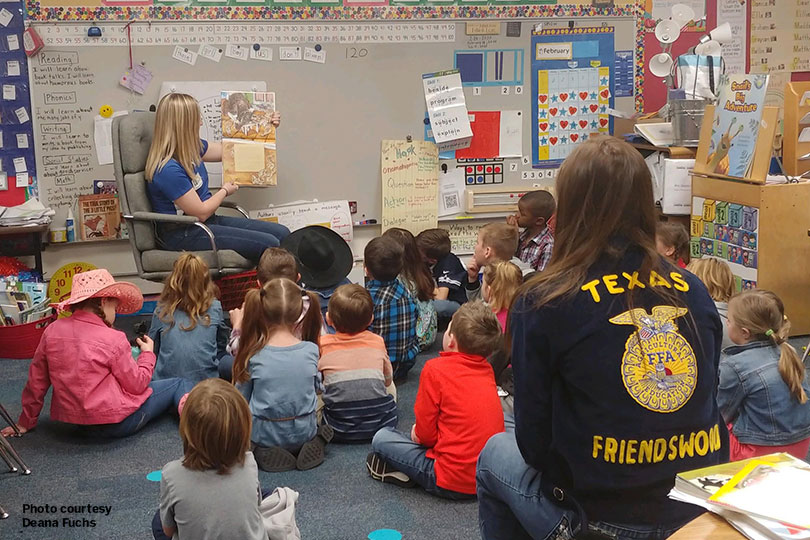By Jennifer Whitlock
Field Editor
Two Texas county Farm Bureaus were recently awarded White-Reinhardt mini-grants from the American Farm Bureau Foundation for Agriculture to help increase agricultural literacy in their schools.
Brazos County Farm Bureau (CFB) received funds to work with College Station ISD teacher Hillarie Rollins to help sustain an existing chicken coop project she began on her elementary campus in 2017.
“One of the TEKS [Texas Essential Knowledge and Skills] standards for first grade is to learn about the chicken life cycle, so a few other teachers and I were just talking about how cool it would be to keep the chickens we were already hatching on-campus so students could see the full life cycle,” Rollins said. “Our principal agreed to the project. So, now our students see them hatch from eggs, grow into a chicken and collect eggs from those chickens in a full-circle lesson. We have about 100 first-graders who benefit from this experience each year.”
But disaster struck this past fall when a predator infiltrated the coop and took out most of the school’s flock. The funds from the new grant will be used to update the chicken’s habitat and make it more secure for future chicks, Rollins said.
“One of the hurdles to overcome when we first proposed this project was having enough teacher involvement to care for the birds, but many of the teachers want to come on the weekends and summers to help water and feed them and check on them. Without their teamwork and help, this might not be possible,” she said.
“But through this grant, we’ll be able to add an automatic waterer, feeder and coop door, plus beef up some security and safety features in the coop. So, we can keep chickens on campus for longer, because we won’t have to rely so much on volunteers to do all the work and the chickens will ultimately be safer now, too.”
Having chickens on campus offers additional learning opportunities and experiences besides what her students learn in her first-grade classroom, said Rollins, a former Texas Farm Bureau (TFB) Agriculture in the Classroom Outstanding Teacher award recipient.

“Before COVID-19 restrictions, the fourth-graders would volunteer to help take care of the chickens, collect eggs and sell them to teachers on campus. We use the funds from selling eggs to purchase food for the chickens. It’s fun for the students to watch the chicks grow, and the reward is when they get to collect eggs,” Rollins said. “But there are lots of learning opportunities. I’ve had so many teachers who told me students with language barriers and speech disabilities will engage with them over the chickens, where they couldn’t get them to say anything before. Teachers sometimes use class chicken coop visits as a little reward at the end of the day. It’s turned into an opportunity for the whole campus and everyone benefits.”
Brazoria-Galveston CFB was awarded a White-Reinhardt mini-grant to help distribute accurate ag books and agriculture-related materials to third- and fourth-grade classes across three school districts: Friendswood ISD, Santa Fe ISD and Sweeny ISD.
Through the project, FFA students will visit elementary school classrooms to read the book Full of Beans: Henry Ford Grows a Car and complete an activity with the students from the book’s accompanying educator guide.
The book and educator’s guide will be donated to the teacher for use in future classes, said Deana Fuchs, agriculture program coordinator for Brazoria-Galveston CFB.
“We hope to reach 45 classrooms—approximately 45 teachers and 1,000 students,” Fuchs said. “The students can ask some questions about farming and ranching, and we hope this will give them a better understanding of how important agriculture is to all of us.”
Participation of the older FFA students will hopefully inspire and encourage the elementary school students to get involved in FFA in junior high and high school, which may lead to participation in the agricultural industry as adults, Fuchs said.
“I’m hoping these FFA students get something out of it, too. This will help with their presentation skills, give them opportunities to learn more about agriculture and provides a way for them to give back to their school district, so I think there’s a lot of benefit for them, as well,” she said. “I always look for ways to grow those relationships because those kids are our future.”
The idea for the grant proposal came from other projects Fuchs has undertaken in the past.
“I work with kids in FFA chapters in my counties where we have monthly meetings, and I try to teach them how to be good advocates for agriculture to other kids and adults,” she said. “The FFA chapter out of Friendswood did a project where we went into elementary schools and read a book to them and did an activity with the students. The students did the reading, chose the activity and planned it all out. I was just the mentor.”

After hosting a similar event for National Read-a-Book Day with adult volunteers that reached about 15 other classrooms in the area, Fuchs came up with the White-Reinhardt project.
“My thought was to take these two different successes and combine them together. Now, we will work with four FFA chapters and have the FFA students actually making those connections in their districts’ elementary schools,” she said. “This helps Farm Bureau have a better relationship with those FFA chapters and with the schools and opens the door for future involvement with Farm Bureau for both the teachers and the students.”
The project is a good introduction to Brazoria-Galveston CFB’s Ag in the Classroom program, she added.
“We will follow up these classroom visits with a letter thanking each teacher for allowing us to come into their classroom and explaining some of our Farm Bureau programs, lessons and resources we have available,” Fuchs said. “This may allow us to find ways for our board members and other production agricultural professionals to visit the classroom in-person or virtually at some point down the road.”
Get more information on the next cycle of grants from American Farm Bureau Foundation for Agriculture.
